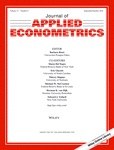
Boswijk, H., Bun, M. and Schinkel, M. (2019). Cartel Dating Journal of Applied Econometrics, 34(1):26--42.
-
Affiliated authors
-
Publication year2019
-
JournalJournal of Applied Econometrics
The begin and end dates of cartels are often ambiguous, despite competition authorities stating them with precision. The legally established infringement period(s) from documentary evidence need not coincide with the period(s) of actual cartel effects. In this paper, we show that misdating cartel effects leads to a (weak) overestimation of but‐for prices and an underestimation of overcharges. Total overcharges based on comparing but‐for prices to actual prices are a (weak) underestimation of the true amount overcharged, irrespective of the type and size of the misdating. The bias in antitrust damage estimation based on predicted cartel prices can have either sign. We extend the before‐during‐and‐after method with an empirical cartel dating procedure, which infers structural breaks of unknown number and dates that mark the actual begin and end dates of the collusive effects. Empirical findings in the European Sodium Chlorate cartel corroborate our theoretical results.